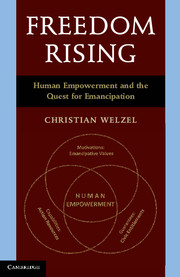Book contents
- Frontmatter
- Dedication
- Contents
- List of Tables
- List of Figures
- List of Boxes
- Abbreviations
- Preface
- Acknowledgment
- Introduction
- Part A Understanding Emancipative Values
- Part B Emancipative Values as a Civic Force
- Part C Democratic Impulses of Emancipative Values
- 8 Entitling People*
- 9 The Rights Revolution*
- 10 The Paradox of Democracy*
- Part D Emancipative Values in Human Civilization
- Conclusion
- References
- Index
9 - The Rights Revolution*
Published online by Cambridge University Press: 05 June 2014
- Frontmatter
- Dedication
- Contents
- List of Tables
- List of Figures
- List of Boxes
- Abbreviations
- Preface
- Acknowledgment
- Introduction
- Part A Understanding Emancipative Values
- Part B Emancipative Values as a Civic Force
- Part C Democratic Impulses of Emancipative Values
- 8 Entitling People*
- 9 The Rights Revolution*
- 10 The Paradox of Democracy*
- Part D Emancipative Values in Human Civilization
- Conclusion
- References
- Index
Summary
The efforts to stigmatize, and in many cases to criminalize, temptations to violence have been advanced in a cascade of campaigns for “rights” – civil rights, women’s rights, children’s rights, gay rights, and animal rights. These movements are tightly bunched in the second half of the 20th century, and I will refer to them as the rights revolutions.
– Steven Pinker 2011Human empowerment is the emancipation of people from external domination. Emancipation requires equal freedoms, and such freedoms are granted through citizen rights. Ironically, as large as the theme of citizen rights looms in our time, it has literally been absent throughout most of history. But since the onset of preindustrial capitalism, starting with the abolition of slavery and feudal privileges, history takes a new turn: the granting of rights to common people, the steady differentiation of these rights, and their continuous extension to new groups and territories become a major trend of development – indeed a signature theme of modernity itself (Marshall 1950; Moyn 2010). This tendency is visible in a chain of milestone documents from the Habeas Corpus Act in 1640 to the Virginia Bill of Rights in 1776, and the Universal Declaration of Human Rights in 1948 to the Convention on the Rights of Persons with Disabilities in 2006 (Donnelly 2003; Ishay 2008).
In what some call a rights revolution (Epp 1998; Franck 2001; Ignatieff 2000; Pinker 2011), the tendency to expand the rights of common people has intensified over recent decades. The rights revolution is evident in the growing prominence of rights discourses in the international arena (Moravcsik 2000; Landman 2005, 2006; Simmons 2009; Pegram 2010), the granting of rights in democratizing societies (Foweraker & Landman 1997; Beetham 1999; Donnelly 2003; Brettschneider 2007), and the attribution of rights to underprivileged groups, women being by far the largest (UNIFEM 2000; Walter 2001; Strom 2003; Coleman 2004). More recently, new rights are attributed to the increasingly visible group of lesbians, gays, bisexuals, and transsexuals (LGBTs) (Ungar 2000; Mertus 2007; Smith 2008; Wilson 2009).
- Type
- Chapter
- Information
- Freedom RisingHuman Empowerment and the Quest for Emancipation, pp. 278 - 306Publisher: Cambridge University PressPrint publication year: 2013



